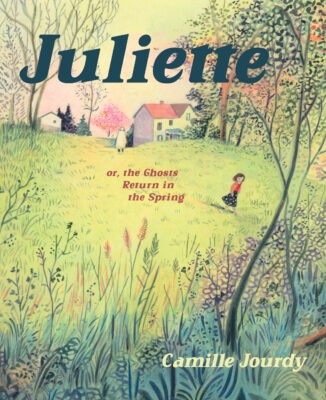To take issue with Thomas Wolfe, sometimes you can go home again. Just don’t get your hopes up too high.
The opening pages of Camille Jourdy’s new graphic novel find the thirty-something heroine disembarking from a train that has taken her from Paris back to the town of her youth, where she now seeks to spend a few weeks tying up various family loose ends. It doesn’t quite work out that way.
Juliette is all but unique among her cohort in having made the break from the provinces. Among those who have stayed, she is considered to have taken on airs in the glamorous capital. “Look who decided to visit: our little Parisian” is her sister’s idea of a warm welcome. But Juliette isn’t feeling especially glamorous herself. Anxiety attacks, big-city burnout, loneliness, concern for her increasingly forgetful father and her dementia-stricken grandmother: it’s all piling up into one big recipe for a meltdown. At one point, in a fairly representative passage, she finds herself Googling “irregular heartbeat” on a laptop in her childhood bedroom.
Juliette Drawn & Quarterly
or, the Ghosts Return in the Spring
Camille Jourdy
Translated by Aleshia Jensen
$39.95
paper
236pp
9781770466647
Title notwithstanding, then, Juliette is an ensemble piece, and its large cast is stage-managed with a masterly hand. Jourdy makes a technically intricate undertaking look effortless. It’s no simple matter to go in short intervals from individual interior monologues to intimate two-person conversations to full-on dinner-party chorus. To extend the music metaphor, Jourdy is composing for soloists, chamber ensembles, and full orchestra. Add to these elements an exquisitely measured pacing, and you have a work that rewards contemplation even while pulling you inexorably to the end.
First published in French in 2016, Juliette is Jourdy’s eighth book, and the author shows every indication of having found and refined her visual signature to perfection. Working with watercolours, she lands on a sweet spot combining cartoon-style depiction of people and a more realist treatment of their physical surroundings. Nothing like the postcard France of popular imagination, nor part of the ring suburbs to which so many of the country’s immigrants have been consigned, Juliette’s town practically demands to be called “nondescript.” Yet it has its own beauty, and Jourdy pays it the respect it is due.
The whole book is infused with a melancholy that will chime with admirers of Chris Ware’s epic American graphic novels. What’s different here, though, is a comic touch all the more effective for its sparing deployment. To apply a parallel from classic French cinema, it’s like finding a bit of Jacques Tati in among the François Truffaut. Jourdy wrings true pathos out of prosaic situations and characters who, in a less nuanced treatment, might easily be reduced to mere figures of fun. Best of all, in a work not really beholden to plot, a tentative love story arises organically. To reveal the two parties involved – you can probably guess one of them – would be wrong, though. As with everything else in this brilliantly affecting book, readers deserve to watch things unfold with the same slowly dawning sense of wonder experienced by the characters themselves.mRb






0 Comments